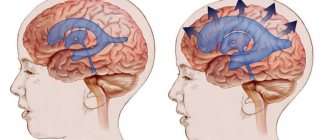What it is?
Hospitalism is a psychological term for a serious mental disorder in children or adults.
This phenomenon is due to a lack of human communication, narrow social contacts or complete isolation from society.
Thus, hospitalism is a lag in the development of children or degradation of emotional and behavioral reactions in adults.
More often found in early, preschool and school age. It is rare in youth, maturity and old age.
Science has studied cases of morbidity in children who, for one reason or another, spent a long time in hospitals or other medical institutions, boarding schools or orphanages.
The syndrome manifests itself in pronounced deviations from the norm in communication and intellectual abilities, intellectual abilities, as well as fine motor skills and the ability to express emotions. Such children have difficulty mastering basic movements, are delayed in growth, muscle mass, and age-related physical development.
Adult patients suffer from depression and loss of interest in the world around them.
Symptoms of hospitalism
Children in the first years of life at the onset of this pathology become lethargic. Noted:
- no attempts at partying;
- reluctance to try to make and maintain eye contact;
- obsessive actions are diagnosed;
- possible lag in psycho-emotional development;
- there are inappropriate emotional reactions.
Most often, such symptoms are observed in children being raised in orphanages, week-long nurseries, and in medical hospitals. The pathology is also detected in children who constantly live with their mother, but do not receive the proper attention from her. In most cases, such a situation develops in socially disadvantaged families. There are also cases of hospitalization of children in apparently prosperous families, in which the parents are overly busy with their careers, social life, and the mother simply did not want to give birth to a child.
Causes
The reasons for this phenomenon are currently purely theoretical; there are no studies that would confirm the nature of this mental disorder in practice.
For a long time, observing children with hospitalization, doctors believed that their condition was caused by hypovitaminosis, weakened immunity, poor nutrition and conditions of detention in government institutions.
Rene Spitz began to carefully study the deviation . The author of the concept of “hospitalism” in the 40s of the twentieth century collected and analyzed dozens of cases of the disease in children living in hospitals and orphanages.
The scientist refuted the assumption that it is unfavorable living conditions that are the cause of deviations in child development, since the disease was also found in those children who ate well and received proper care. Therefore, the researcher made a revolutionary assumption that hospitalism is based on internal, unresolvable conflicts in the child’s soul.
Together with a group of like-minded people, Spitz created a theory about the origin of this disorder, using the teachings of Sigmund Freud.
As a result, psychologists began to consider the lack of parental warmth, love and care during the neonatal period and infancy to be the trigger for hospitalism. Separation or absence of a mother (father) becomes a psychological trauma for a child, the consequences of which on a subconscious level are reflected in his entire subsequent life.
Presumably, it is this internal conflict, unresolved even in adulthood, that can become the starting point for the manifestation of hospitalism in mature or even elderly people.
Proving his theory, Spitz relied on examples where small children who survived in the wild and were “raised” by animals, upon returning to civilization, were never able to develop the skills of human behavior and the proper level of communication with other people.
Nowadays, continuing research into this disorder, experts have found that the disease can be a consequence not only of orphanhood , but also of emotional neglect of a child in a complete family, where the problem of loneliness becomes relevant for children from an early age. Kids, of course, cannot fully understand their parents’ behavior, but they feel their attitude very subtly and suffer greatly from the lack of trusting, tactile and warm emotional contacts.
What is hospitalism in psychology and psychiatry? The essence of deviation
Hospitalism in psychology is a complex of psychosomatic disorders that develop as a result of a long stay of an adult or child without loved ones in hospital or other similar conditions (boarding school, orphanage). This phenomenon reflects the psychophysical state of patients deprived of the care of loved ones for a long time.
Most often, hospitalism develops in children left without a mother or a substitute relative, which is associated with the instability of their unformed psyche, however, there are situations when this phenomenon also occurs among adult patients who are forced to stay in secure institutions for a long time (hospitals, nursing homes) .
Hospitalism, which developed in a person in childhood, can make itself felt in adulthood, even if the person has managed to adapt to life.
In psychiatry, hospitalism is associated with a general deterioration in psychophysical condition due to a long stay in hospital or residential institutions.
The essence of hospitalism in both psychology and psychiatry is associated with destructive reactions that occur when a person is separated from home and loved ones (especially mothers for children), which lead to a number of negative consequences:
- deterioration of general psychophysical condition;
- mental disorders;
- difficulties with adaptation to society and life in general.
Symptoms
Since hospitalism in psychology is a developmental delay for children and degradation for mature people, its symptoms in these age groups are somewhat different.
Pediatric hospitalism is characterized by:
- deviations from normal height and weight indicators, such children have a certain appearance - they are short, thin, with undeveloped muscles;
- difficulties in carrying out active physical actions, children learn to walk late and move uncertainly, run, hold with their hands and use household objects;
- impoverished facial expressions and emotional reactions, i.e. they do not respond as they should to many events in life, they cannot laugh at something, enjoy new things, or enjoy games;
- frequent monotonous movements of the body, limbs, lips or eyes (swinging the head from side to side, squeezing and unclenching the hands, blinking, etc.);
- susceptibility to somatic diseases, children quickly “pick up” infections and suffer from them with difficulty, suffer from numerous chronic ailments;
- speech delay;
- underdevelopment of intelligence;
- late development of hygiene skills (potty, hand washing, shower procedures).
What actions of adults provoke the development of the disorder?
- lack of normal communication with the child (games, conversations, exchange of emotions);
- poor care for babies (ignoring their needs, unwillingness to bathe, change clothes, put them to bed, feed them, accompany them on walks).
In addition, such parents do not devote time to teaching their child, do not want to help in mastering the first steps, read to the baby, draw or play with him.
Symptoms of the disorder in adults
In this age group, the cause of hospitalism is a lack of human communication and isolation. Therefore, cases of the disease are often found in prisons, remote settlements or nursing homes.
Such people, deprived of society, full-fledged friendships and family ties, become apathetic and lack of initiative, cannot clearly formulate their thoughts and express them, as well as respond to positive or negative stimuli from the outside.
They stop reading, watching TV, going for walks, have a frozen look and a detached expression on their face, and their limbs may twitch periodically.
Hospitalization in children
The syndrome affects physical, emotional, and intellectual development. In the first months of life, the main sign of hospitalism is the absence of a revival complex - the baby does not respond with a smile to a smile and speech, there is no fixation of gaze on the face or surrounding objects, there is no motor revival, vocalizations (screams, “hooks”) when an adult approaches. In healthy infants, the complex revitalization reaction develops to its maximum by three to four months; in hospitalized infants, it develops later, and individual links are absent. There is frequent, prolonged, mild crying. Insufficient weight gain is objectively determined. The skill of holding the head and turning the body independently is delayed.
During the period of 4-12 months, hospitalism in children is manifested by a lag in motor skills, the first signs of delayed speech development: at 5-8 months a prolonged hum occurs, at 9 months - impoverished babbling. Most children 4-5 months old can hold their head up on their own; ten-month olds begin to crawl. There is insufficient coordination, movements are abrupt, unstable, and uncertain. The lag is manifested by the inability to pick up a toy and move it from hand to hand. Compulsive movements are often observed: body swaying, head shaking, stereotypical hitting of objects against a wall or table. There is insufficient interest in communication; crying and aggression become a frequent response. Objectively, lethargy, apathy, muscle hypotonia, sleep and appetite disturbances are observed.
In early childhood, the main signs of hospitalism are violations of social, communication and speech skills. The first words appear after 14 months, in most children - by 3-3.5 years. Phrasal speech is represented by commands - “give”, “let go”. Interest in communication is reduced; during contact with people, the child is apathetic, withdrawn or emotionally hot-tempered - crying, screaming, fighting, running away. Obsessions are observed: thumb sucking, hair tip sucking, body rocking. Lack of coordination continues. The game is often manipulative in nature - toys are used for a functional purpose (throwing a ball, combing a doll). Sometimes stereotypical actions persist: the child does not build a tower of blocks, but knocks them on the table. The formation of hygiene skills and the use of a potty are delayed.
Treatment
Helping people with hospitalism is not easy; the therapeutic effect is associated with identifying the psychological problem that triggered the disease mechanism.
More often, specialists prefer to first work with such patients individually , this is due to the fact that their communication skills are not developed and it is quite difficult to apply them in a group.
Such people have to be re-taught communication skills, develop fine motor skills, and enrich the emotional sphere. However, as soon as positive changes are detected, patients can be invited to group sessions. And although this disease is considered quite complex, in some cases progress can be made and the quality of life of patients is significantly improved.
Psychologists and psychotherapists use art therapy, music, body therapy, relaxation classes, training for the development of communication and socialization skills for children and adults with hospitalism; family counseling is actively practiced, including parents and loved ones in the treatment process.
Correction of hospitalism requires an integrated approach and the participation of educators and teachers in the treatment. Children need special exercises to train attention, motor skills, thinking, and memory.
Drug therapy is rarely used, only in advanced severe cases.
Treatment methods
The main method of treating hospital syndrome is psychotherapy. A competent psychotherapist will select the appropriate treatment method for a particular patient. The following types can be used:
- cognitive behavioral psychotherapy;
- social psychotherapy;
- group psychotherapy;
- a set of rehabilitation measures (cancellation of drug therapy, increased contacts with others, etc.).
Hospitalism syndrome, although a negative human reaction to hospital conditions, is quite natural and common. With the timely intervention of a psychologist and support from loved ones, a person can easily cope with this problem.
Can hospitalism be cured?
At the initial stage, hospitalism is treatable. The best way to do this is to close the baby’s need for a close connection with an adult. But this is almost impossible in shelters and in dysfunctional families. Therefore, experts prescribe other treatment methods. For example, special games-exercises for training memory, motor skills of hands and fingers. In addition, playing with adults somehow evokes positive emotions in the child. In severe cases, special children's medications are prescribed that stabilize the functioning of the nervous system and improve the emotional state, regardless of age.








